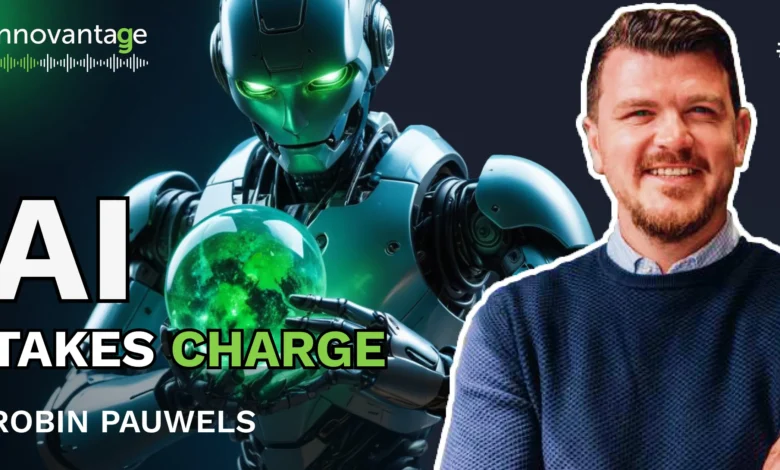
These days businesses and individuals all over the world are actively exploring the power and capabilities of AI. The Innovantage podcast hosted by Sigli’s CBDO Max Golikov can greatly support them in this exciting journey.
In the third episode of the podcast, Max talked to Robin Pauwels. Robin is the Chief Operating Officer of The Beacon Innovation Community, an IT community in Antwerp, Belgium. He started his career as a software developer but later moved into business and entrepreneurship. Though it may seem to be a dramatic twist, Robin explained that such a path was quite logical for him. He always had an entrepreneurial spirit and was interested in how businesses operated. In his professional life, he tried himself in different spheres: from managing an online advertising agency and leading a web shop to building websites.
But later his passion for business and strong technical background led him to the place where he is at the moment.
The Beacon Innovation Community: What kind of IT community is it?
This innovation hub was founded as a community of companies that work with such technologies as IoT and AI. Nevertheless, with time flow, it has become much wider than that. As Robin explained, today this IT community unites 100 companies that offer very specific services and digital solutions for the chosen industries. The focus is made on a row of particular spheres, including the port and shipping industry, manufacturing, gas and oil, smart mobility, and smart cities.
The Beacon helps these companies establish ties with their potential partners and clients. For its members, this digital IT community organizes a lot of networking, matchmaking, and educational events, where they can tell others about themselves, learn something new, and get inspiration for their future projects.
The Beacon IT community closely works with the local government, private sector, as well as Research and development (R&D) institutions, to facilitate a lot of processes for its members.
Robin also talked about the physical space that The Beacon offers. This IT community has a six-floor building that provides co-working spaces, meeting rooms, and a recording studio. 40 companies have already become residents and have their physical workplaces there.
Initially, Robin joined The Beacon as an Innovation Community Builder. Since then, in his career, he needs to communicate a lot, listen to companies’ concerns and expectations, establish cooperation with other networking IT communities, organize events, and do many other things that keep the community together.
AI-powered solutions by The Beacon members
In their conversation, Max asked Robin about the AI products that The Beacon community members are working on at the moment.
Computer vision for drone technologies
One of them is a project of a drone company. It has different types of devices, such as driving or floating drones. They can perform inspections of assets and places where human beings can’t get. Special cameras and sensors help them to capture and measure certain things.
The company is active at the port of Antwerp and its drones can inspect big windmills or container cranes for erosion. The collected data is sent to the company’s platform powered by an AI computer vision engine. As a result, AI can help to detect some spots or areas that should be maintained or fixed. Already today, it is a commercialized project.
AI tools for container operators and ports
Robin also mentioned a product for a container business that is currently at the proof of concept (PoC) stage. This means that the idea itself is just being tested. If it turns out to be a successful one, it will be transformed into a full-scale solution that will become publicly available.
The company is building a system for counting containers with the help of codes or texts placed on them. When these containers are moving across the port environment or through the container terminals, cameras can capture their codes. With the help of computer vision algorithms, operators can get precise info about the number of containers on the terminal at any moment in real time.
Another company is building an AI engine to predict container traffic and provide recommendations for placing containers at the port facilities. It’s very important not to hide your container somewhere under others when it needs to be picked up the next day. Such engines are already being used at ports today.
Also, AI is widely applied by companies for the optimization of big manufacturing environments. Artificial intelligence can efficiently forecast the time and the volumes of raw materials needed for production.
Challenges of powering businesses processes with AI
When talking about using AI in everyday tasks, Robin highlighted that he is impressed with what GenAI and AI copilots can offer today. Such copilots are virtual assistants integrated into software environments. They can provide suggestions for performing various tasks, automate repetitive actions, and enhance users’ productivity. One of the core technologies that power them is NLP. It focuses on the interaction between computers and humans using natural language. Thanks to this, our devices can understand our requests and respond to them in our language.
For example, Microsoft 365 Copilot can work with a huge volume of data about your company that you have across your Microsoft environment. Such solutions make our data actionable. They make it easier to work with data, to find it, and to learn from it.
Max and Robin agreed that the implementation of AI copilots can be a rather expensive initiative. But is it the only factor that stops companies from integrating virtual assistants? Robin named a couple of other pitfalls that businesses should stay aware of.
- Data quality. It’s highly important to make sure that for feeding AI algorithms you use only high-quality, well-structured data. The “Shit-in-Shit-out” (SiSo) principle works perfectly in this case. The use of scattered data and data silos won’t let you enjoy the full potential of AI copilots.
- Trust. Unfortunately, today a lot of people, especially in very traditional industries, still have a lot of prejudices regarding the use of AI. Some employees may be afraid of being replaced by AI. Nevertheless, in reality, artificial intelligence is often used for performing some repetitive tasks that people even don’t like. And in general, its implementation is a very positive trend.
It’s vital to educate people and explain how AI in general and copilots in particular can help them in their everyday processes. Even if some tasks are taken by artificial intelligence, employees can be taught to do some new things within the same organization.
Talent shortage
The adoption of AI tools requires new experts who will develop and further maintain them. Today, the availability of professional engineers with relevant skills is rather limited.
Belgium’s job market: Does it follow global trends?
Today we can hear a lot about people losing their jobs all over the world due to layoffs amid the unstable economic situation. Nevertheless, according to Robin, Belgium is quite different in this aspect, especially when it comes to tech companies.
Some businesses in other industries are struggling with the consequences of the post-pandemic crisis. But tech businesses are successfully growing. There are still a lot of venture capital funds and investors who are ready to pump money into young projects. Thanks to their financial support, startups can turn their ideas into real products.
Why is AI more popular than blockchain today?
While talking about the most promising technologies, Robin mentioned that today AI looks like the most popular and widely discussed one. He compared the hype around it with the interest in blockchain and crypto that we observed some years ago. But there is a clear difference between them now. While blockchain started losing its fans, the army of AI supporters is only growing.
This can be explained by the fact that AI has more use cases and more tangible applications nowadays. AI is rather comprehensible to a wide audience but blockchain is a very complex concept to understand for non-tech people.
However, it’s important to highlight that the fate of AI wasn’t as cloudless as it may seem. For some decades, it remained in the background as it didn’t have any useful everyday applications at that time.
By now, we have been using some AI-powered tools in our daily lives for over a decade. For example, even when you take a photo with your iPhone and want to cut the image of yourself — it will be done by AI. That’s a very simple case. And people can easily see the effect of using artificial intelligence.
Of course, the majority of users do not have deep theoretical knowledge about this technology but it is not required for everyday interaction with such tools.
Does this mean that blockchain is not interesting to tech companies? Definitely not. There are a lot of projects that build solutions for various domains. Robin mentioned one very understandable use case of this technology.
For example, blockchain can help to prevent drug trafficking at ports.
When truck drivers come to a port to pick up containers, they need to show a PIN code. However, such codes are known to many participants of this logistics process. Criminals can easily detect people who have access to these codes and then obtain these codes by blackmailing them. When such PIN codes are stored on blockchain, the entire process becomes safer.
In this case, it is more difficult to get these codes. Moreover, it will be always possible to track who and when used each of them.
Some people voice concerns that blockchain can be also used in various illegal activities. For instance, criminals can rely on blockchain for money laundering. However, Robin highlights that cash is used for such purposes much more often today but nobody offers to stop using fiat money because of that.
At the moment, the blockchain and crypto industries are not enough regulated. That’s the major concern about them. But we can expect that the thighs will change soon.
Future of AI applications: What’s next?
Robin strongly believes that the mass adoption of AI tools will continue. However, we should stay aware of potential dangers related to the use of AI.
For example, today the output of AI models can be biased. In other words, the results produced by such models can be prejudiced due to faulty data or algorithms. This could greatly spoil user experiences. That’s why the developers of such algorithms should train them with relevant data, which can bring social and economic benefits.
Some people say that AI will kill our creativity and our desire to learn new things. Robin has the opposite opinion. He thinks that AI can even inspire people to enhance their knowledge. If we use calculators, it doesn’t mean that we can’t add two numbers or multiply them. But such devices can facilitate and streamline these tasks for us.
The same is true about AI. It can help us in business and private lives. The key thing here is to find good applications for it.
Another very important question that governments in different regions, including the EU, are currently working on is the regulation of AI and data use. These issues are common for many emerging technologies. It’s crucial to set clear frameworks for sharing data and using it for training models. At the moment, it is still a grey zone.
The industry that can greatly benefit from implementing AI
Robin highlighted that healthcare is one of those domains that could enjoy the most tangible benefits of using AI.
AI-powered solutions can help to detect diseases faster and save thousands of lives. Already now, computer vision is successfully applied for detecting skin cancer.
Moreover, AI models can be utilized by scientists to create more effective medicines significantly faster.
AI can be helpful for initial diagnostics. Instead of waiting for their appointments, patients can already get some recommendations. Of course, it’s vital to realize that such recommendations are not commands. They are based on the probability, but not on the exact diagnosis. Due to the related risks, people should make decisions on their own after a consultation with a doctor.
What should we stay aware of amid the AI revolution?
New times require new skills from everyone. One of the most important of them is to understand and see AI limitations. Such models as ChatGPT can hallucinate and provide wrong answers in absolutely any domain. Even when you ask very simple questions, you can get false replies. Unfortunately, not everyone knows that today.
Robin believes that that’s the responsibility of the educational system and parents to explain to the young generation how to use new technologies that come to the market.
The same situation is with the internet. There are not so many programs that can educate people on how they should behave online to protect their personal data and privacy. For example, a lot of people even do not understand what will be done with their data after they accept cookies.
Also, there are a lot of concerns regarding sharing photos and videos on social media. Little is known about how these platforms process everything that people post.
However, Robin emphasized that it doesn’t mean that we should be afraid of new technologies. We all know that driving a car is dangerous. But when we take these dangers into account, it’s already a different thing and this process can become safer.
This rule can be applied to using social media, AI tools, and other technologies. It’s always very important to understand what is behind them and why you need to use them.
Wrapping up
At the end of the conversation, Robin revealed some future plans of The Beacon IT community. He said that they will keep educating companies and industries on the benefits of AI and digitalization in general. They will continue helping people meet each other, cooperate with each other, discuss projects, find efficient solutions together, and inspire each other to develop cutting-edge innovations.
The Innovantage podcast shares some of these tasks. Max invites experts who can provide their insights into how digital technologies and AI in particular can transform the business world. Don’t miss the next episodes to get a fresh portion of knowledge and inspiration!
Read more:
AI in Education: How LLMs and Oxford AI Research Are Transforming Education in 2025
Neural Networks & Expert Systems: the AI Revolution in the Era of Digital Transformation



